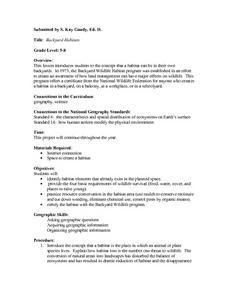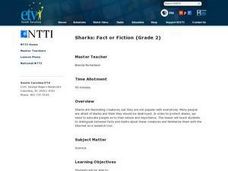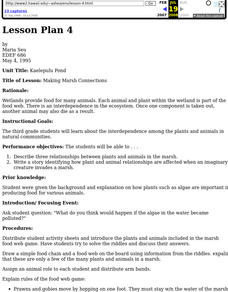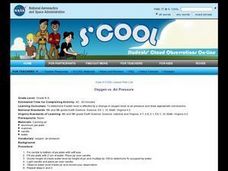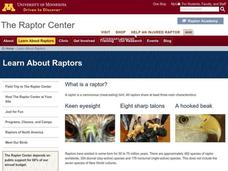Curated OER
Backyard Habitats
Young scholars identify habitat elements. They create a habitat in a backyard, on a balcony, at a workplace, or in a schoolyard and provide the four basic requirements of wildlife survival (food, water, cover, and places to raise young)....
Curated OER
Do As the Romans: Construct an Aqueduct!
Middle schoolers explore how the Romans engineered and built aqueducts. They read a manual, explore the Construct a Roman Aqueduct online activity, and construct an aqueduct that will transport two liters of water across a short...
Curated OER
Salt Marshes And Their Inhabitants
Students investigate the ecosystem of the salt marshes. This is done in order to develop an appreciation for this type of environment. They conduct research using a variety of resources. Students are given samples of different organisms...
Curated OER
Guetemala's Changing Forest
Eighth graders compare their local ecological zone to the tropical rainforest. In this natural ecology lesson, 8th graders complete an activity about the differences in ecological zones. They compare their biome to the Guatemalan...
Curated OER
Sharks: Fact or Fiction
Second graders discover the truth about sharks. In this shark lesson plan, 2nd graders use different resources to help distinguish between fact and fiction with what they have heard about sharks. They complete an attached activity sheet.
Curated OER
Monk Seal Research Expedition
Students study data. In this seal research lesson, students act as scientific researchers observing Monk seals in their habitat. They work in small groups to record data from a video and when through they share a piece of information...
Curated OER
Non Native Species: English Ivy-Landscape Plant or Deadly Killer?
Young scholars study the impact that invasive species have on biodiversity and more natural areas.
Curated OER
What Kind of Garden Would Grow in Our Schoolyard?
Students perform soil tests for pH, nitrogen, phosphorus, potassium, composition and water percolation rate and assess the conditions in the schoolyard.
Curated OER
Vermicomposting
Second graders create an eco-bin and study the habitat of the worm in soil. In this vermicomposting instructional activity, 2nd graders observe the effects of water ( too much or too little) and other factors on the eco-bin.
Curated OER
Making Marsh Connections
Third graders explore the interdependence among the plants and animals in natural communities.
Curated OER
Scientific Data: It's Not as Pretty as It Looks!
The difference between accuracy and precision is fundamental for high school science learners. Using test kits for nitrate concentration in water, they compare readings with each other. They consider the accuracy, precision, and bias of...
Curated OER
Onomatopoeia
This mini-activity on onomatopoeia introduces the device through a poem and definition. It culminates in drawing an element of nature with the sound associated with it written across the picture.
Curated OER
Lotic Environment
Students assemble a classroom river model as an example of a lotic system. They control and measure biotic and abiotic information for the in-class system and compare data with a lotic system in a natural environment.
Curated OER
Oxygen vs. Air Pressure
Learners conduct an experiment to determine if water level is affected by a change in oxygen level or air pressure.
Curated OER
Stream Chemistry Monitoring
Learners become familiar with real-world gathering of chemical data. The experience how the science is done: the nature of analysis, data collection, interpretation, and presentation. They study a nearby body of water for their experiment.
Curated OER
Friendship Mobiles
Students discuss how the sun, wind, clouds and other elements of nature can be their friends. They create mobile demonstrating this.
Curated OER
NATIVE AMERICANS
Pupils study the importance of nature to Native Americans and discover the growth stages of Northern beans and mustard seeds.
Curated OER
Take a Dip: Be a Field Guide
Pupils create a Visitor's Field Guide for the local area in order to enhance the understanding of natural features of the area for those who may be unfamiliar with the area.
Curated OER
Recycling
Students examine different "cycles" that are found in nature, such as the water cycle and recycling. They create their own artwork about cycles to be displayed on a bulletin board
Curated OER
Venom!
Students examine the nature of venom. They conduct an experiment to demonstrate how proteins such as venoms can be denatured using raw eggs, beakers, heated water, and compresses.
Curated OER
Strangers in Their Own Land
Students use interview techniques to explore the traditional wisdom of fishers, farmers, First Nations, and other peoples whose close relationship with nature gives them a deeper understanding of, and sensitivity toward, climatic cycles...
Curated OER
John Muir: Long Ago and Now
Students explore nature objects brought indoors such as rocks, seeds, leaves and shells to identify where the objects came from. They hear stories about John Muir's life and make booklets about nature areas they enjoy.
Curated OER
River Study
Students study physical features of a local stream. They study how to identify water features on topographic maps.
Curated OER
Give Me The C and D Canal!!!
Learners estimate the distance from Baltimore to Philadelphia via the water route before the Chesapeake and Delaware Canal was built. Students study canals and how transportation and economic necessities dictate the building of a canal.


